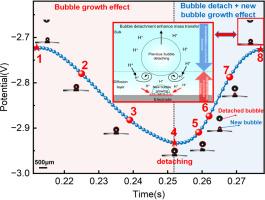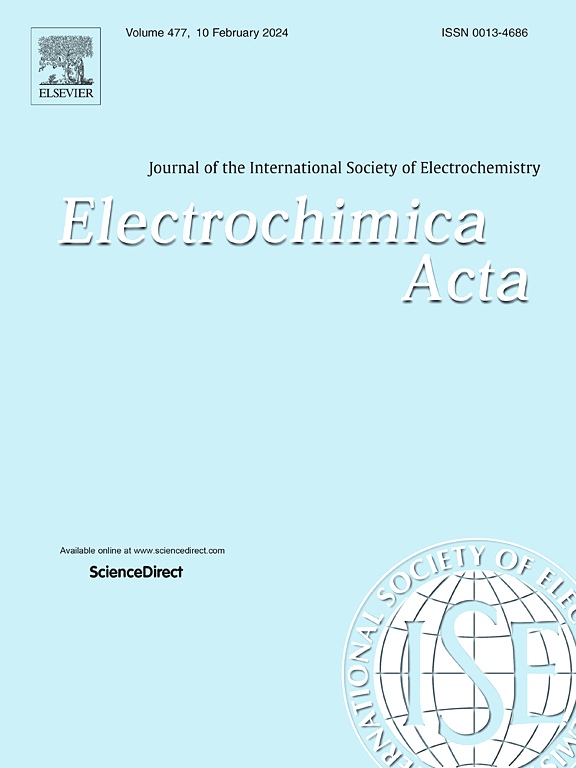恒流析氢过程中气泡驱动对流引起延迟电位响应
IF 5.6
3区 材料科学
Q1 ELECTROCHEMISTRY
引用次数: 0
摘要
析氢反应过程中气体的析出引起复杂的界面动力学,并引起电位的振荡。然而,气泡行为和过电位响应之间的实时耦合仍然知之甚少。在这项研究中,我们报告了在恒流HER过程中以前未被认识到的延迟现象:过电位的最小值并不与气泡脱离的时刻一致,而是在几十毫秒之后发生-在电极表面已经形成并生长到几百微米之后。通过同步高速成像和时间分辨电化学测量,我们发现延迟时间随着电流密度和气泡分离尺寸的增加而增加。跨多个周期的统计分析证实了分离大小、振荡幅度和延迟时间之间的强相关性。值得注意的是,在涉及连续气泡分离的罕见情况下,延迟和振幅都进一步放大。互补的CFD模拟证实,气泡尾迹产生瞬态界面对流,显著增强了局部传质,暂时降低了浓度过电位,即使在电极上表面新气泡开始生长,也延迟了反应电位的恢复。这些发现揭示了一个以前未被认识到的动态反馈机制,其中气泡演化主动调节界面传质,为气体参与的电化学过程提供了新的见解,并为优化多相电化学系统提供了潜在的策略。本文章由计算机程序翻译,如有差异,请以英文原文为准。


Bubble-driven convection induces delayed potential response in constant-current hydrogen evolution
Gas evolution during the hydrogen evolution reaction (HER) induces complex interfacial dynamics and can lead to oscillations in potential. However, the real-time coupling between bubble behavior and overpotential response remains poorly understood. In this study, we report a previously unrecognized delay phenomenon during constant-current HER: the minimum in overpotential does not coincide with the moment of bubble detachment, but instead occurs tens of milliseconds later—after a new bubble has already formed and grown to several hundred microns on the electrode surface. Using synchronized high-speed imaging and time-resolved electrochemical measurements, we show that the delay time increases consistently with current density and bubble detachment size. Statistical analysis across multiple cycles confirms strong correlations among detachment size, oscillation amplitude, and delay time. Notably, in rare cases involving successive bubble detachments, both the delay and amplitude are further amplified. Complementary CFD simulations confirm that bubble wake generates transient interfacial convection, which significantly enhances local mass transfer and temporarily reduces the concentration overpotential, thereby delaying the recovery of reaction potential even as a surface new bubble begins to grow on electrode. These findings unveil a previously unrecognized dynamic feedback mechanism in which gas bubble evolution actively modulates interfacial mass transfer, offering new insight into gas-involved electrochemical processes and a potential strategy for optimizing multiphase electrochemical systems.
求助全文
通过发布文献求助,成功后即可免费获取论文全文。
去求助
来源期刊

Electrochimica Acta
工程技术-电化学
CiteScore
11.30
自引率
6.10%
发文量
1634
审稿时长
41 days
期刊介绍:
Electrochimica Acta is an international journal. It is intended for the publication of both original work and reviews in the field of electrochemistry. Electrochemistry should be interpreted to mean any of the research fields covered by the Divisions of the International Society of Electrochemistry listed below, as well as emerging scientific domains covered by ISE New Topics Committee.
 求助内容:
求助内容: 应助结果提醒方式:
应助结果提醒方式:


